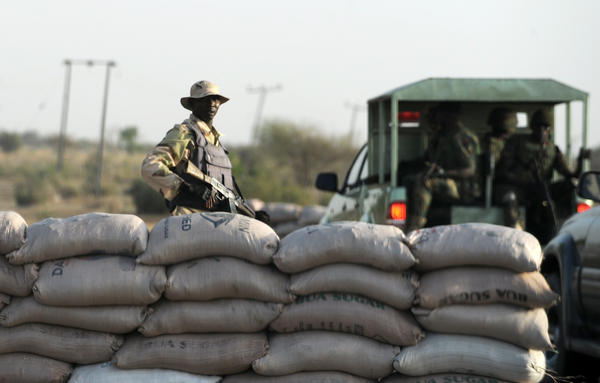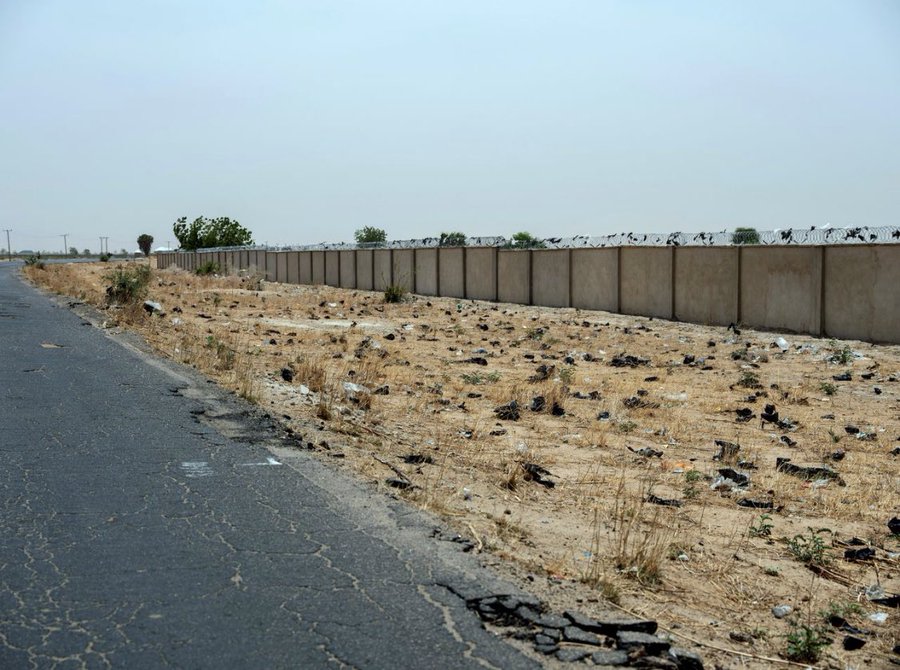Widows Of Slain Nigerian Soldiers Face Eviction Threat In Maiduguri Army Barracks
The widows, whose husbands died fighting Boko Haram and the Islamic State West Africa Province (ISWAP), were summoned on Monday, April 25, and instructed to pack their belongings on or before May 10.

Susan Innocent* is enraged because military authorities at Mailamari Army Barracks in Maiduguri, Borno, Northeast Nigeria, informed her and all other widows that they have only a few weeks to leave their homes.
The widows, whose husbands died fighting Boko Haram and the Islamic State West Africa Province (ISWAP), were summoned on Monday, April 25, and instructed to pack their belongings on or before May 10.
“We cried that the notice was short and protested that they have not given us our late husbands’ life insurance. Our plea could not yield much success. It only extended our eviction date from May 10 to May 25 and most of us have nowhere to go. I have been here since my husband was ambushed by terrorists,” Susan sighed heavily during a telephone interview with HumAngle.
Unending war
For over 12 years, the Nigerian government has engaged in a war with Boko Haram and its offshoot ISWAP, insurgent groups seeking to establish a state governed by extremist Islamic principles in northeastern Nigeria.
Over 47,000 people have been killed in the insurgency since 2009 when it broke out. The activities of the terror groups have also led to the displacement of over two million people.
An often-overlooked statistic is that of many soldiers who have died in the war, including Susan’s late husband (name withheld) who died in 2018.

Susan’s plights
Soon after Susan was told about her husband’s death, she was advised by the Nigerian Army authorities to start processing his gratuity being the next of kin. She told our reporter that she was able to perfect the process in due time and she got her husband’s gratuity and burial benefit.
“My husband died as a lance corporal and they paid ₦1,044,000 as his gratuity. I gave his mother ₦400,000 and held on to the remaining. The sad thing is that the money was not enough because I have to feed three children and pay their school fees.”
Even when the army allowed them to occupy their accommodation in Mailamari Barracks, accessing basic life needs has been difficult as Susan awaits her husband’s life insurance. She became more depressed when she heard the news of eviction from the barracks.
“There are 41 widows in the barracks and when we told the colonel who passed the message that we had nowhere to go, he said they don’t care. We were told that there is no place for soldiers to stay and as such we should all leave. When we asked about life insurance and payment of our children’s school fees, they said they will contact us from anywhere.
“Ordinarily, we should get paid before leaving the barracks but that is not happening. My husband is expected to get ₦3 million for life insurance but they don’t want to even help us,” she lamented.
Many widows cry for help
Khadijah Hassan* told HumAngle her husband was killed in April 2020 as a staff sergeant; eight years after they got married.
“How will I take care of the three children my husband left behind? The military headquarters told widows that we would get all the benefits before they send us away but that has changed because they are sending us out without paying the life insurance of our late husbands.
“I have no family here. How am I supposed to pack our loads? Where are we expected to get money? They haven’t even paid for the school fee sponsorship of our kids yet. How am I expected to get a house in less than a month? We don’t even have a solution to our problem,” cried Khadijah, who is from Taraba.

While Lateefah Quadri* had always wanted to leave the barracks since her husband died during an operation in the Sambisa forest in 2018, the failure of the authorities to pay his life insurance has forced the family to remain.
“The condolence letter says they will pay all benefits but they haven’t done that years after. This is not the best moment for us. They paid gratuity but the life insurance has not been looked into. We know that we are going to leave the barracks but never expected it this way.
“My husband died without saying goodbye to his children. My husband sent a text message to me that he was going to combat terrorists. He promised to get back home soon but that never happened till now. They should please help us so that we can help our children.”
Rahmat Azeez* also lost her husband, who was a lance corporal, in Dec. 2018. He was killed by terrorists when their first son was fours years old and the second child was barely a year old. She never thought she would be evicted from the barracks until she got her husband’s entitlement.
“I am playing the role of a mother and father at the same time. The eviction ultimatum is hell.”
Failed guidelines?
The guidelines on the administration of military pensions for personnel of Nigeria’s armed forces provide that benefits should be paid to the Next of Kin (NOK).
Form 9B, a death certificate, letter of introduction of their NOKs, condolence letter from their last units, sworn affidavit deposed to by the NOK authenticating them as NOK, the ID card of the deceased personnel, passport photographs of the NOK and any form of identification of the NOK are expected to be sent to military pension board at Dutse-Alhaji, Abuja, by their respective offices.
These documents are used to process the deceased personnel’s death benefits which would be paid following interviews.
The guidelines do not stipulate how long it should take for the final payment of entitlements to be ready, stating only that entitlements will be paid into the bank account provided by the Next of Kin. This loophole makes it difficult to hold the Nigerian Army to account.
“They keep making promises that we will get out life insurance but that appears difficult to get,” Rahmat said.
Evasive authorities
When contacted for comment, Olayinka Lawal, spokesperson of the Nigerian Military Pension Board, told HumAngle that the Nigerian Army’s spokesperson was in a better position to comment on the issue. “The life insurance entitlement is not within the jurisdiction of the military pension board,” he explained.
However, the army’s spokesperson, Onyema Nwachukwu, did not respond to enquiries on the failure of the authorities to pay the life insurance of the late soldiers to their widows. He also did not respond to enquiries on the eviction notice.
Meanwhile, multiple military sources told our reporter that it is against the military guidelines to evict widows from barracks when all their husbands’ entitlements are yet to be paid.
“It is totally unacceptable for them to evict the widows. There is a problem somewhere and military authorities must take this development seriously to tackle the injustice against these women,” an officer who spoke under anonymity because he was not authorised to speak told HumAngle.
*Names of the widows interviewed for this report were changed to protect them.
Support Our Journalism
There are millions of ordinary people affected by conflict in Africa whose stories are missing in the mainstream media. HumAngle is determined to tell those challenging and under-reported stories, hoping that the people impacted by these conflicts will find the safety and security they deserve.
To ensure that we continue to provide public service coverage, we have a small favour to ask you. We want you to be part of our journalistic endeavour by contributing a token to us.
Your donation will further promote a robust, free, and independent media.
Donate HereStay Closer To The Stories That Matter




